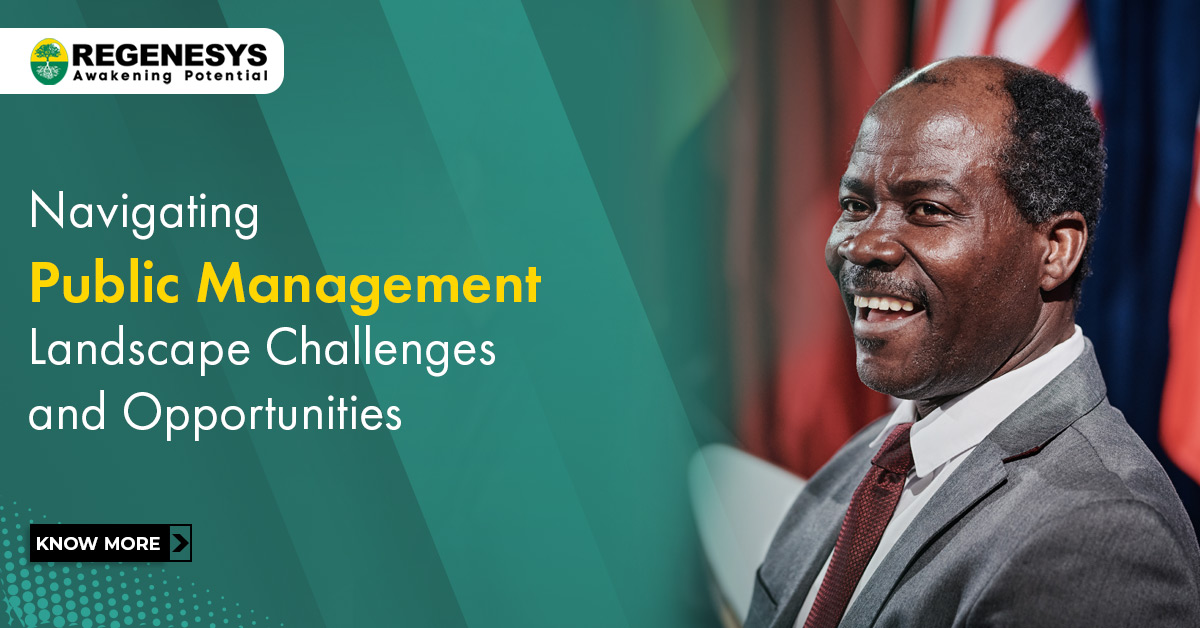Public management in South Africa grapples with multifaceted challenges while presenting promising opportunities for those embarking on a journey within this domain. As the country navigates complexities inherent in its socio-political fabric, individuals equipped with an MPM (Master in Public Management) degree from esteemed institutions like Regenesys hold the key to affecting transformative change.
Table of Contents
Understanding of MPM
The Master in Public Management (MPM) programme is designed to equip individuals with a comprehensive skill set necessary for effective leadership and management within the public sector. It combines theoretical knowledge with practical insights, covering areas such as public policy analysis, strategic management, ethics, and governance structures. MPM graduates develop critical thinking, problem-solving, and communication skills vital for navigating complexities within public administration and addressing challenges like bureaucratic inefficiencies, resource constraints, and socio-political dynamics. The programme prepares individuals for diverse career opportunities in governmental bodies, non-profits, and consultancy firms, empowering them to drive positive change and contribute meaningfully to creating more transparent, accountable, and efficient governance structures.
Challenges in Public Management in South Africa
Public management in South Africa encounters challenges steeped in historical, economic, and administrative factors. Persistent issues such as corruption, bureaucratic inefficiencies, and resource constraints pose significant hurdles in effective governance and service delivery. The legacy of apartheid, coupled with ongoing socio-economic disparities, amplifies the complexity of managing public resources equitably.
Moreover, the intricate balance between political demands and administrative autonomy remains a challenge. The need for accountable, transparent, and efficient governance often clashes with political pressures, creating a nuanced environment that demands adept management skills.
Public management in South Africa faces a myriad of challenges stemming from historical, socio-political, and economic factors that have shaped the country’s administrative landscape.
- Historical Legacy: The country’s history of apartheid has left a lasting impact on public management. The system entrenched inequalities, creating disparities in access to resources, services, and opportunities across different demographic groups. The effects of this history still reverberate, complicating efforts towards equitable governance and resource allocation.
- Corruption and Governance Issues: Corruption remains a significant obstacle, impeding effective public service delivery. Instances of mismanagement, bribery, and fraudulent practices within governmental institutions hamper progress, eroding trust in public entities and impeding socio-economic development.
- Bureaucratic Inefficiencies: The bureaucratic system often faces challenges in terms of inefficiencies, red tape, and cumbersome processes. This bureaucratic inertia can slow down decision-making processes and hinder the timely implementation of policies and programmes.
- Resource Constraints: South Africa grapples with resource limitations, particularly in the allocation of funds and human resources. Budgetary constraints and inadequate infrastructure hinder the government’s ability to address pressing societal needs effectively.
- Complex Socio-Political Dynamics: Balancing political demands with administrative efficiency poses a complex challenge. Political influences can sometimes interfere with administrative autonomy, creating a delicate environment where navigating between political agendas and public service mandates becomes intricate.
- Socio-Economic Disparities: The socio-economic divide, exacerbated by historical injustices, presents a considerable challenge. Addressing disparities in income, education, healthcare, and access to basic services requires comprehensive and inclusive policies, which often face implementation challenges.
- Technology and Innovation Gap: Keeping pace with technological advancements and leveraging innovation in public management practices is a challenge. Adopting and integrating technology into administrative processes while ensuring inclusivity and accessibility remains a significant hurdle.
Opportunities for MPM Graduates
Amidst these challenges, pursuing an MPM degree presents a gateway to navigate and transform South Africa’s public management landscape. A Master in Public Management and Governance empowers individuals with comprehensive knowledge and skills to tackle these issues effectively.
A Master’s Degree in Public Management equips graduates with a profound understanding of public policy, organisational dynamics, and strategic leadership. It nurtures critical thinking and problem-solving abilities essential for devising innovative solutions in complex administrative settings.
Graduates armed with an MPM degree find themselves well-positioned for diverse career opportunities. Roles in public administration, policy analysis, strategic planning, and project management beckon, allowing them to contribute meaningfully to society and effect substantial change within governmental and non-governmental sectors.
Regenesys and the Master of Public Management
Regenesys school of Public Management, an esteemed institution, offers a robust Master of Public Management programme. This programme delves deep into the intricacies of public management, providing students with a comprehensive understanding of governance structures, policy formulation, and leadership strategies crucial for navigating the challenges inherent in South Africa’s public sector.
The curriculum integrates contemporary theories with practical insights, fostering a holistic learning experience. Furthermore, Regenesys’ emphasis on ethical leadership and sustainable development equips graduates with a principled approach towards addressing societal challenges.
The opportunities post-MPM from Regenesys span across various sectors. Graduates can pursue roles as public policy analysts, government advisors, or NGO leaders, driving impactful change through their acquired knowledge and skills.
Conclusion
The field of public management in South Africa presents a terrain fraught with challenges but ripe with opportunities for those equipped with an MPM degree. Regenesys, with its comprehensive Master of Public Management programme, stands as a beacon, nurturing future leaders poised to steer the country towards sustainable, effective governance.
FAQS
What is Public Management?
Public Management involves overseeing and directing governmental or non-profit organisations, focusing on efficient resource allocation, policy implementation, and service delivery to the public.
Why is Public Management important in South Africa?
Public Management is crucial in South Africa as it ensures effective governance, equitable resource distribution, and the delivery of essential services to all citizens, addressing historical inequalities and fostering socio-economic development.
What are the career prospects after completing a Masters in Public Management?
Graduates with an MPM degree can pursue diverse roles in government departments, NGOs, international organisations, consultancy firms, or academia. They can work as policy analysts, public administrators, project managers, or advisors in various sectors.
How does Public Management contribute to addressing socio-economic disparities in South Africa?
Public Management strategies play a vital role in developing and implementing policies that aim to bridge socio-economic gaps. Through effective resource allocation, equitable service delivery, and inclusive policies, public managers contribute to reducing disparities.
What are the challenges faced by Public Managers in South Africa?
Challenges include combating corruption, navigating bureaucratic inefficiencies, addressing resource constraints, managing socio-political dynamics, and bridging the technology and innovation gap while ensuring equitable service delivery.
How can individuals contribute to improving Public Management in South Africa?
Individuals can contribute by pursuing education in Public Management, advocating for transparency and accountability, participating in policy-making processes, supporting ethical leadership, and leveraging innovation to enhance administrative practices.






